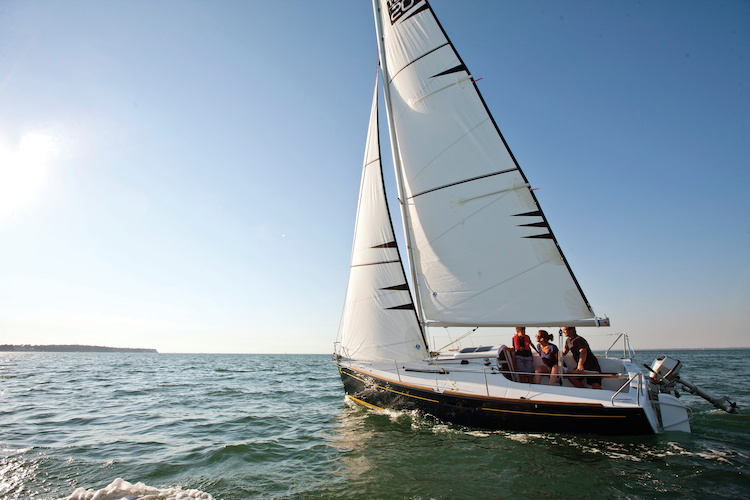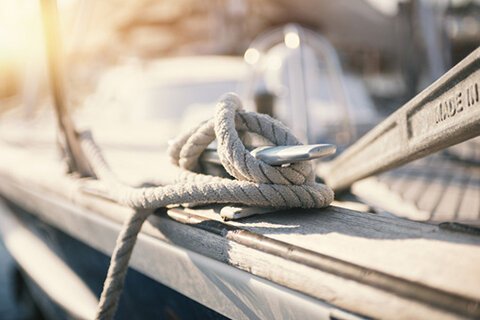Dreaming of buying a sailboat of your very own? If you’ve been bitten by the sailing bug, it's important to understand that when it comes to boats, it’s not a one-size (or type) fits-all proposition. Sailing takes lots of resources, namely time and money, so it’s important to determine exactly what you want from your on-the-water experience before starting your search for the perfect boat.
Explore Sailboat Types & Manufacturers

Buying a Sailboat Checklist
There are many choices of boats and all are good for their intended purpose. With utmost honesty, you need to answer questions about the following six factors prior to purchase.
Use
What kind of sailing do you anticipate doing? Will you be solo dinghy sailing on inland lakes, daysailing in coastal waters, racing offshore, overnighting on weekends with kids or cruising to distant lands as a couple while living aboard for extended periods (6-12 months)? A 60-foot steel cruiser won’t make sense on inland lakes and a roto-molded sailing dinghy may not be safe on the open ocean. Plan realistically about what you’ll really do with your boat and who will be with you to share the fun.
Budget
The purchase price of the boat is just the beginning of the expenses so create a budget. You may need a trailer to tow it or a slip to berth it. Larger boats will need to be registered with the DMV or Coast Guard, and insured. Maintenance will divide into periodic upkeep, upgrades and repairs, and potentially a complete refit if you buy a boatyard special. New boats add premiums for extra outfitting like electronics or sails. Will you do the maintenance yourself or pay contractors? Will you buy new or used? Most people overspend, so buy the smallest most affordable boat that can still meet your sailing expectations.
Learn more by reading the Costs of Boat Ownership.
Free Time
Realistically assess the amount of time you’ll have to spend on the boat. Now subtract the time you’ll be fixing, cleaning and generally caring for it. That’s how much time you’ll have left to enjoy it. Consider if you’ll be happy spending time on the boat alone (and if you can manage it by yourself), or if you’ll have to rely on the schedules and desires of others. Most boats don’t leave their slips (or trailers) 80 percent of the time so owning may not be the wisest decision.
Location
How accessible will your boat need to be for you to actively enjoy it? Is an hour of driving to the slip a deterrence? How about an hour spent hooking the trailer up to your vehicle and towing it to the launch ramp? Do you live in a place with a significant sailing season or water with adequate depth for a keelboat? Depending on location, simple outboard powered daysailer may make more sense for you than a larger boat that must be hauled and winterized.

Condition & Design
An older boat may seem like a bargain but unless you’re very handy and have lots of time, you won’t want a project. Decide on construction materials (wood is maintenance intensive while fiberglass is more forgiving). Decide on the rigging: a simple sloop with a self-tacking jib is easy for new sailors and single-handers. Decide on the underbody: a keelboat will be more stable and easier to manage, but a dinghy with a centerboard will be able to sail in shallow waters and light breezes. If your sailing partner gets claustrophobic or nervous when the boat heels, a catamaran with greater space and stability may be more appealing.
Experience & Aspirations
Finally, determine your current experience level and what you want to accomplish. If you’re new to sailing go small, simple and solid. If you want to race, start with an agile design but one that won’t reward every mistake with a dunking. Give yourself room to grow. Buy a boat just a little beyond your capabilities and grow into it. However, if you aim too high, you’ll scare yourself and stay home rather than going out and learning. If needed, invest in some sailing lessons along with your boat.
Could it be Your 'Forever Boat'?
Starting small and simple has the advantage of usually being more affordable in case your first boat isn’t the right fit for the long term. You can always step up once your skills, budget and aspirations increase. With time, it will become easier to identify exactly what your next boat should or shouldn’t be but remember, the “perfect boat” is a fallacy so make informed choices about tradeoffs and have fun shopping.
Looking for more on sailing and sailboats? Read...
- Learning the Basics of Sailing
- 10 Nautical & Sailing Terms to Know
- Beginner Sailing Tips
- Why Sailing?


